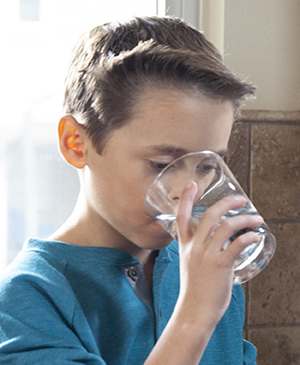Treating Viral Respiratory Illness in Children
Viral respiratory illnesses include colds, the flu, RSV (respiratory syncytial virus), and coronaviruses. SARS-CoV-2 that causes COVID-19 is a type of coronavirus. Illness from SARS-CoV-2 can be similar to other viruses, but this sheet is about viral respiratory illness other than COVID-19. If your child has been exposed to COVID-19, contact your healthcare provider for more instructions.
Treatment of viral respiratory illness focuses on easing your child’s symptoms and making sure that the infection doesn't get worse. Antibiotics don't work against viruses. Antiviral medicines may be used for the flu in some cases. Always call your child’s healthcare provider or seek medical care right away if your child has trouble breathing.
Helping your child feel better

-
Give your child plenty of fluids, such as water or apple juice.
-
Make sure your child gets plenty of rest.
-
Keep your baby’s nose clear. Use a rubber bulb suction device to remove mucus as needed. Don't be aggressive when suctioning. This may cause more swelling and discomfort.
-
Raise the head of your child's bed slightly to make breathing easier.
-
Run a cool-mist humidifier or vaporizer in your child’s room to keep the air moist and nasal passages clear.
-
Don't let anyone smoke near your child.
-
Treat your child’s fever with acetaminophen. In babies 6 months or older, you may use ibuprofen instead to help reduce the fever. Never give aspirin to a child under age 18. It could cause a rare but serious condition called Reye syndrome. This illness may affect the liver and brain.
When to seek medical care
Most children get over colds and the flu on their own in time, with rest and care from you. Call your child's healthcare provider or seek medical care right away if your child:
-
Has a fever of 100.4°F (38°C) in a baby younger than 3 months
-
Has a repeated fever of 104°F (40°C) or higher
-
Has nausea or vomiting, or can’t keep even small amounts of liquid down
-
Hasn’t urinated for 6 hours or more, or has dark or strong-smelling urine
-
Has a harsh cough, a cough that doesn't get better, wheezing, or trouble breathing
-
Has flaring of the nostrils while breathing
-
Has retractions, which is when the skin pulls in between the ribs, with breathing
-
Has severe or increasing pain
-
Develops a skin rash
-
Is very tired or lethargic
-
Develops a blue color to the skin around the lips or on the fingers or toes
Online Medical Reviewer:
Barry Zingman MD
Online Medical Reviewer:
L Renee Watson MSN RN
Online Medical Reviewer:
Rita Sather RN
Date Last Reviewed:
12/1/2022
© 2000-2024 The StayWell Company, LLC. All rights reserved. This information is not intended as a substitute for professional medical care. Always follow your healthcare professional's instructions.